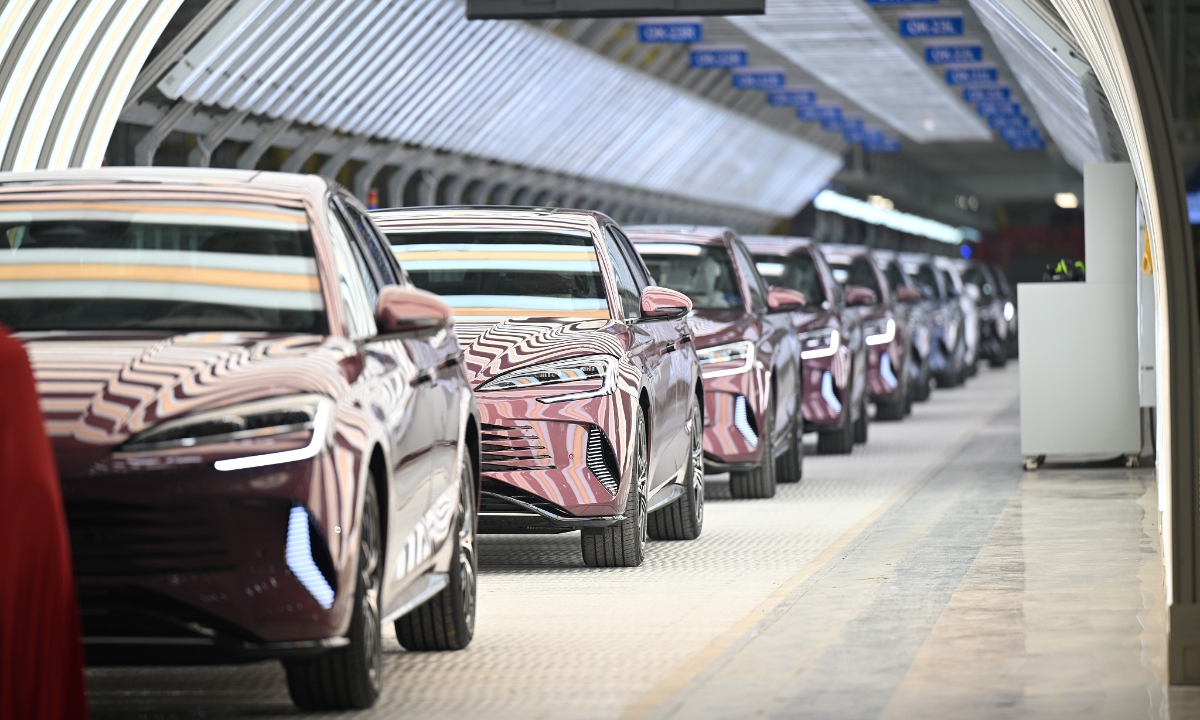EV Photo:VCG
The overall confidence of Chinese enterprises in the European business environment has been diminished, with the EU intensively adopting unilateral measures such as probes under the EU Foreign Subsidies Regulation (FSR), the China Chamber of Commerce to the EU (CCCEU) said on Sunday, expressing concern about the intensified situation for Chinese companies in the bloc.
The remarks were made in response to media reports that China’s Great Wall Motor (GWM) is shutting its Europe headquarters in Munich, Germany, a move that has immediately drawn wide attention as the EU’s protectionist moves targeting Chinese carmakers are multiplying, following in the footsteps of the US.
Chinese experts said it is a pity that the EU is wielding its protectionist stick at Chinese companies and products, as these companies are contributing to the region’s green transformation with cost-effective products and services. If the trend continues, it will backfire on the EU’s green development, they warned.
The GWM will close its European headquarters and lay off its all 100 employees on August 1, citing tough market conditions for electric vehicles (EVs) and the threat of European tariffs on Chinese imports, according to media reports.
Given the increasingly challenging situation in the European EV market, coupled with the impending implementation of European import tariffs, the Chinese carmaker will adjust its future European strategy accordingly, the Global Times learned from a statement that the company sent over the weekend.
The group highly values the autonomy of its existing dealer partners and will collaborate with them to continue sales and services in Europe, providing customers with high-value products and experiences, said the carmaker.
The GWM has always adhered to a long-term global strategy, rooted in Europe and serving Europe, which has been the company’s principle since entering the European market, the company noted.
The car company is reorganizing its presence in the European market, said the statement, noting that it will take over the responsibility of providing necessary business support to existing European dealers and customers from Europe.
Additionally, the company has plans to expand into new markets. The operations of Great Wall Motor Deutschland GmbH in Germany will be terminated in August, the company said. Simultaneously, the GWM’s local parts warehouse will be relocated from Nuremberg, Germany to Amsterdam, the Netherlands, doubling its capacity to better serve customers in the European region.
Responding to GWM’s move, the CCCEU told the Global Times on Sunday in an exclusive interview that “the withdrawal of individual companies from the local market is a strategic adjustment made for commercial reasons.”
Chinese companies have always been enthusiastic about greenfield investment in Europe. Due to the long construction times for greenfield projects, key permits or policy support may not be fulfilled during the construction process due to changes in local governments and other factors, resulting in companies struggling to build greenfield projects while encountering setbacks and difficulties, said the CCCEU.
Additionally, since the EU began anti-subsidy investigations against Chinese EVs last year, many enterprises reported a negative impact on their sales and reputations in Europe, according to the CCCEU.
The confidence of Chinese companies in the bloc has been shattered by the EU’s intensive adoption of unilateral measures such as investigations under the FSR and the use of government procurement tools, the chamber said.
The CCCEU urged the EU and its member states to provide a more friendly and convenient business environment for Chinese enterprises and support them in contributing to the EU’s green transition.
The GWM is not alone. Some other Chinese carmakers are also planning to adjust their market strategies in the EU in response to the intensified situation targeting Chinese industry players in the region, according to media reports.
Although China’s highly efficient EVs are “in Europe for Europe” in terms of helping the bloc achieve its carbon neutrality goals and combat climate change, the EU, influenced by various factors like parliamentary elections, is resorting to protectionist measures against Chinese automotive companies to appease voters, which is really a pity, Wang Yiwei, director of the Institute of International Affairs at the Renmin University of China, told the Global Times on Sunday.
The automotive industry is pivotal in Europe, symbolizing industrialization, particularly in countries like Germany. Therefore, their astonishment and reluctance to accept China’s rapid advances in EVs in recent years stem not only from subsidies but also from China’s industrial prowess, infrastructure, government services and advantageous electricity rates, Wang said.
Faced with various types of pressure imposed by Europe on Chinese automotive companies, they should better defend their rights while enhancing localization efforts, the Chinese expert noted.
The US and EU have implemented restrictions targeting China’s emerging sectors, such as new-energy vehicles. In response to the trend, Marco Fernandes, a Brazilian political commentator, told the Global Times in a recent interview that he doesn’t think the US and the EU will stop this behavior, as “they are realizing that they are being left behind China in terms of development.”
In a roundtable meeting held with the participation of Chinese and Spanish companies, Chinese Commerce Minister Wang Wentao said that recently, the EU has discriminated against China by using trade remedies, international procurement tools and FSRs intensively against Chinese products such as electric vehicles, locomotives, photovoltaic products, wind power, security inspections and medical equipment, citing the erroneous narratives of “overcapacity” and “unfair competition.”
Such moves have continuously increased the risk of China-EU economic and trade friction, the minister noted.
“We hope to properly handle economic and trade friction through dialogue and consultation, taking into account the legitimate concerns of both sides and avoiding the escalation of trade friction,” the minister said.
If the European side’s words and actions are inconsistent and continue to suppress Chinese enterprises, China will take all necessary measures to firmly safeguard the legitimate interests of Chinese companies, he noted.

